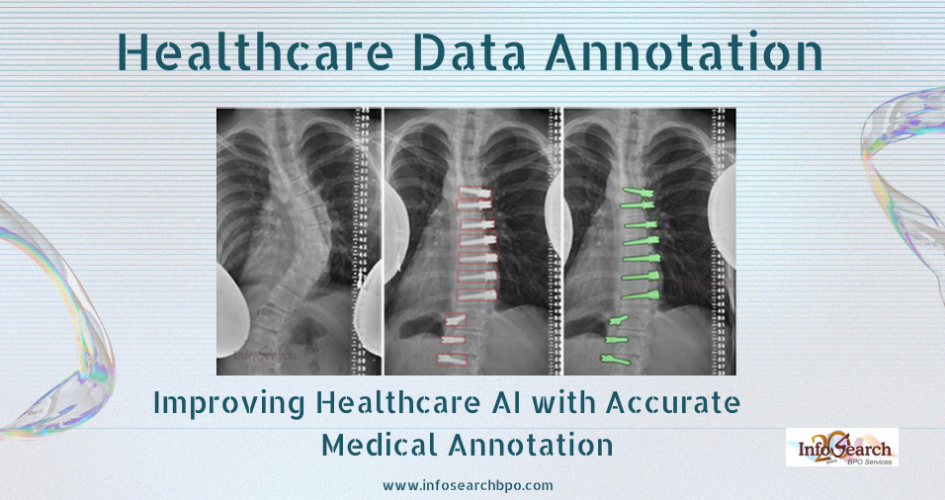Artificial Intelligence is transforming the healthcare industry’s diagnosis of diseases to forecast treatment outcomes. However, in the case of every successful medical AI model, there is one underrated but extremely important detail, namely proper medical data annotation. Its absence interferes even with the best conceived algorithms to produce dependable results. So what is so special about annotation in healthcare AI and how is it accomplished?
Infosearch provides medical data annotation services for healthcare industry. We provide pharmaceutical labelling, disease, diagnosis & detection, clinical efficiency enhancement, NLP in healthcare and more. Contact Infosearch to outsource your medical annotation services.
What Is Medical Data Annotation?
Annotating healthcare data, including medical images, patient records, lab reports, and signals) to help AI systems learn to understand and interpret medical data is known as medical data annotation.
Examples include:
- Tumor labeling of MRI/CT scans
- Diagnosis of pathology slides of cancer cells
- Tagging of ultrasound organs
- Tagging of arrhythmia on ECG readings
The Importance of Proper Annotation in Healthcare
Medicine is at stake unlike general-purpose AI. When communication schemes are erroneous there are dire dreams on the lives of patients.
Quality data annotation gives:
- Improved detection of the disease
- Accurate diagnostic
- Highly accelerated and stable AI training
- Generalization to the population of patients
With imprecise labels, models can be wrong in their diagnosis, or fail to identify key conditions this may postpone treatment or make inappropriate decisions.
Medical Data Types of Annotation
o Bounding boxes, segmentation masks or pixel-wise annotation of radiology and pathology images.
o Applied where it detects tumors, establishes the confines of organs, spots fractures etc.
o Labeling of unstructured clinical notes, EHRs or reports to extract symptoms, medications, diagnoses, etc.
- Signal Annotation
o Annotated ECG or EEG signals with any anomaly or issues like arrhythmias or seizures.
- Volume Annotation 3D
o On volumetric scans (CT, MRI) where the annotations occurring across many slices in three dimensions.
Who is Annotating?
- Critical labeling. In this case, medical professionals (radiologists, pathologists, clinicians) are subject matter expert labelers.
- The tooling specialists can be utilized after the rules are developed by annotation specialists.
- The usage of AI-powered tools would aid in the pre-labeling of data, which would be reviewed and corrected by people.
With this human-AI collaboration, there is guaranteed scalability as well as quality.
Difficulties in Medical data Annotation
- Skills necessary: Requires domain experts, which is expensive and time consuming.
- Data confidentiality: Procedures / laws subject to HIPAA and data/information protection.
- Complexity: The medical images tend to be highly complex and they may have subtle details that need to be of high precision.
- Class imbalance: Especially rare diseases imply few instances and annotation becomes more important but also challenging.
Resolutions and Best Practices
By employing standardized procedures of labeling
- Multi-layer review options (double-blind annotation to reach the consensus)
- Annotation with the assistance of AI to accelerate the processes
- Encrypted secure annotation sites
- On-going communication among the data scientist and clinicians
Real-World Impact
Individual AI models that have been trained on properly labeled information are able to:
- Detection of cancers in an early stage
- Forecast heart attacks
- Diagnose diabetic retinopathy
- Enhance the emergency room triage systems
These models make doctors more confident when making diagnosis decisions and prevent diagnostic errors since it allows them to act with high speed.
Final Thoughts
High-quality medical data annotation is the foundation of secure and proper healthcare AI. Although the use of AI is expected to revolutionize medicine, it will be impossible to make without clean, accurately described data provided by professionals. Robust annotation processes Investments in robust annotation is key to safer, smarter, and accessible healthcare.
Better labels result in better models- and better models result in better patient care.
Contact Infosearch to outsource medical annotations to us.








Recent Comments